Has the progressive left in western democracies forgotten how to embrace the mainstream? When I compare the approach which anti-neoliberal causes take in the U.S. and Europe with the approach taken by the same causes in Asian countries, especially Japan, I can only say yes, it has.
One explanation for how pro-labor movements have been wrong-footed is that they have fallen into a trap which the economists espousing free market fundamentalism (most famously perhaps were the so-called “Chicago Boys”, for whom Milton Friedman was their spiritual leader) ended up setting for us. Neoliberalism took particular care to establish an intellectual underpinning. That foundation enabled neoliberal-leaning governments to derive their economic policies, polices for which they could claim a rational – scientific, even – justification.
When the left, belatedly, attempted to challenge neoliberalism’s political vanguard, we had to fight theoretical fire with fire. To do otherwise would have led to the creation of an open goal – that the left was backward, ignorant and anti-intellectual.
Here at Naked Capitalism, we cover at length – and I do mean at length, readers are purposefully challenged to engage with some fairly demanding material at times – the counterarguments to the prevailing neoliberal orthodoxies. And who amongst us hasn’t sat down to read a 2000-word feature debunking this- or that- latest example of so-called free market nonsense with the same sense of anticipation that we sit down to a large portion of broccoli. We know it’s good for us, we know we have to do it and we know it’s part of our essential intake to remain healthy. But really, couldn’t it, just for once, be a little easier and a little more interesting? Or just a little more digestible.
Western anti-establishment traditions haven’t always been so infernally earnest. But in Europe and – most especially – in the U.S. these traditions of simple, bombastic and even crude rebukes to power and authority have succumbed to historical revisionism, sanitization and reframing.
Consider how we are taught to understand one of the more famous early works of the Protestant Reformation, the religious movement which utterly transformed society in several European countries in the 16th century. Known as “The Papal Belvedere”, this woodblock print was produced and distributed in Germany in 1545:

In the Papal Belvedere the cartoon shows two presumably Protestant working class men in contemporary clothing breaking wind in no small quantity in the direction of the Pope who is pictured sitting on a throne issuing a catechism or similar.
Even today, nearly 500 years later, this work is almost shocking in its irreverence and overt display of contempt. Yes, those German peasants literally are meeting the Pope’s fire and brimstone with some altogether different fire of their own making.
Possibly because the imagery is so powerful, so raw, if we are taught about this piece of anti-establishment media today the picture is usually explained away by a historian telling us that due to widespread illiteracy, the peasantry probably couldn’t read the words and so they required a pictorial representation of the same message as in the text.
But that simply isn’t true. The picture works without the words, but the words don’t make sense without the picture. The Latin / Italian at the top left is unintelligible if you try to read it but don’t have the image it goes with.
And consider the context of this 16th century version of a twitter comment. Designed to be quickly and cheaply printed then distributed in places where people gathered (market squares, taverns and so on), scanned quickly then thrown away, the notion that the picture was merely an afterthought is simply ridiculous. It isn’t a subsidiary part of the messaging. It is the message.
It’s no surprise that we in western democracies succumb to self-censorship if we’re told that there’s something base, unsophisticated or downright rude about making a populist appeal. And yet free-market clichés abound. How many times have you heard people talk about or read in print arguments as “the nation’s credit card”, “business being strangled by red tape” or “free trade” all of which come straight out of neoliberalism’s stash of banalities?
One seemingly insurmountable problem is that, because neoliberalism is a construction made entirely out of western capitalism, we almost instinctively find it difficult to critique it overtly. To do so would be somewhat akin to self-flagellation. So we need to cushion the blow a little by turning it into an abstract, theoretical concept and then we can feel safer picking over the minutia of that rather than staring directly at the ugliness of the culture which created it in the first place.
The Japanese, freed from such cultural loyalties, have no such reservations. We can learn a lot from them. We might even find – rediscover might be a better word – a grammar and a vocabulary for how to make clear, concise and direct assaults on neoliberalism’s most obvious failings without thinking we have to over-intellectualize about them.
As the Trans-Pacific Partnership agreement (TPP) continues to drag itself around like a political zombie, those amongst the Japanese population who are opposed to it are demonstrating how to – having already laid out their intellectual arguments over the past few years – engage with the wider population and encourage them to, if they are so inclined, tell the political class in Japan that they don’t want the Diet (Japan’s parliament) to enact the TPP. Numerous blogs, movements, pressure groups, activist collectives and one-man-bands have sprung up to remind people briefly (and the emphasis here is on brevity) what’s wrong with the TPP but then to direct responders to the most appropriate way of turning disquiet into specific action.
What they are most definitely not doing is getting bogged down in discussing the merits, or otherwise, of the theories of capitalism, trade, economics or finance. The contrast between how the Japanese are opposing the TPP and how, typically, free trade agreements are opposed in the west is stark.
As an example, http://tpphantai.com/ (the URL means “Oppose TPP”) is typical of the sort of information which anti-TPP pressure groups produce. Let’s take a look. Apart from essential cultural or linguistic explanations, I’ll keep my commentary to a minimum. The imagery – the website is largely pictorial – speaks for itself. Manga-fans will see some familiar stylistic traits but Japan also has a long cultural tradition of pictorially commenting on current events. In addition to the overt criticisms of the TPP, there’s something else going on in these vignettes – I’ll come back to that when we’ve walked through each of them.
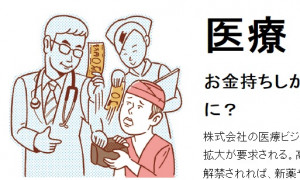
The title for this frame is “Healthcare” and the accompanying text asks if only the rich will be able to afford hospital care. What is interesting is that the doctor and the nurse are seen to be cleaning out the patient’s wallet. They are also given rather avaricious expressions. In Japan, like the west, clinicians are respected and generally seen as wanting to do their best for their patients so it’s not that the Japanese view doctors or nurses as being inherently greedy. What this image does is suggest that once money enters the healthcare scene it causes healthcare practitioners to turn into these kinds of personalities.

The title for this is “Agriculture” and the inference is a clear: Japan-as-a-dustbowl. Non-Japanese might not recognize the attire of the farmer-turned-scarecrow – this is classic rice farmer’s clothing. Rice and domestic rice production is a hot-button issue in Japan.

“Food Safety”, specifically genetically modified food which, as with rice, is another Japanese hot-button topic that the TPP will impinge on.
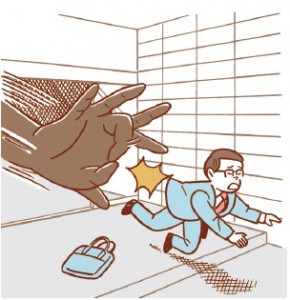
The theme here is “Employment”. But not just any old employment, from the original Japanese text, the word used is the one most associated with permanent, steady employment. This is why the man being kicked out of the office is dressed as an archetypal Japanese salaryman. Also, as a teaser for my final point which I’ll make after we’ve seen all the images, Adam Smith’s invisible hand is clearly visible here and, unlike the theory, isn’t benefiting anyone.

“Education” – this one is probably the creepiest because while the accompanying text warms of the perils of turning education into a business, the kids are clearly learning fast that money talks and are happy, literally, paying to play.
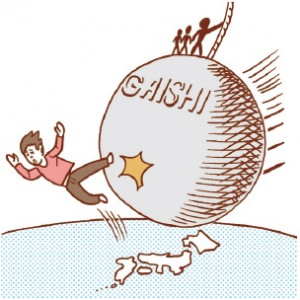
The wrecking ball being swung in this frame, “Public Works”, has “GAISHI” written on it. “Gaishi” means “foreign capital” in Japanese. The Japanese language has a perfectly good “word” of its own for this (外資) which is even written into the subheading text on the website. So why write it in Latin characters on the wrecking ball? Perhaps you can start to guess what else is going on here in the sequence of images.
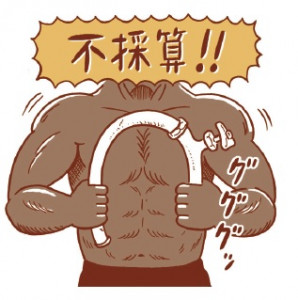
Of the series, this is probably the only one which isn’t understandable without knowing what the Japanese text says. The title is “Public Services” and where the “head” of the strongman is supposed to be the word “Unprofitable” is written in its place. The themes in this picture borrows heavily from classic manga imagery. The topic of this frame is how the TPP would lead to public services being destroyed (the water pipe is used symbolically) in the name of profit.
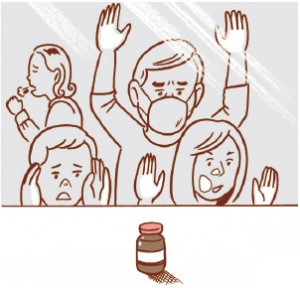
It is perhaps not immediately obvious exactly what this frame is concerned with although the Lichtenstein-influenced composition and colouring have the same cold, chilling effect on the viewer. The title is actually “Intellectual Property”, the people outside the glass can see the medicine, but can’t access it because of the un-seeable but still nevertheless effective barrier.
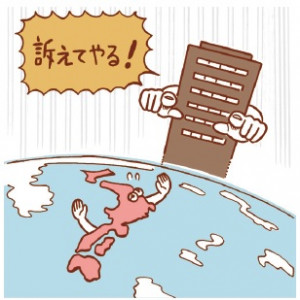
This is about Investor State Dispute Settlement “ISDS”, the big institution telling a cowering Japan (roughly translated) “I’m gunna sue you!”
Okay, there’s no flatulent peasantry in any of those pictures. But something equally subversive and confrontational is going on which a non-Japanese viewer might miss but to the Japanese it would be overt. Look again at what the woman is eating in “Food Safety”. That’s not noodles or sushi. Popcorn and soda aren’t your typical Japanese diet. But while they’re not a burger and fries, they’re redolent of what non-Americans think of as typical U.S. food. And where is the wrecking ball being swung from in “Public Works”? As a reminder of geography, it is coming from the east back to Japan in the west. The U.S., in other words. This is all the stranger as the other TPP-participating countries are in Asia or to the south (Australia and New Zealand). So the ball could have just as accurately been show as coming from the south or the west. Finally, where is the looming office block in “ISDS”? New York or Washington by the look of it.
The TPP opposition campaigns in Japan are, then, certainly not afraid of playing the Japan nationalist and anti-foreign influence card. Nor are they concerned about taking aim at western capitalism’s Holy Grails.
Are they right to take the gloves off in their anti-TPP fight? When does legitimate criticism become offensive, even xenophobic? Or, if the promoters of neoliberal thinking don’t play by Queensbury Rules, shouldn’t the Japanese who are opposed to the TPP not hesitate from getting into a bare knuckle fight with no holds barred?
The answer to which for me is, how far would the Reformation have got if they’d played the game that the papacy wanted them to play?


The most interesting to me is image of the society they want to save from TTP/ISDS. A view of Japan that I believe are seldom described in western media.
It stops short of what I’d describe as intentional, it’s more a natural extension of the Japanese awareness at all times and in most situations of the “in group” vs. “out group” distinction, but what the Japanese present internally (Japanese to Japanese within Japan) is markedly different from what the Japanese present externally (Japanese to non-Japanese outside Japan).
I’ll disagree. What else is there on Facebook/Reddit/twitter (memes) and other places. It ends up that it only preaches to the choir and pushes those you wish to change the minds of away. Or am I missing something? Even this: http://nonapolis.blogspot.com doesn’t do the job, does it? If you agree, it’s a hell yeah and if not it’s a hell no The former might be good for rallying the troops but that’s about it.
Thank you. Very powerful, with clear explanation.
How widespread is this phenomenon in Japan? I remember the “Counterculture” in the West from the 1960s. Comix and poster art promoted an ‘alternative’ social system to the young of the West. That didn’t so much change the ‘system’ as change the aspirations and boundaries of thinking of a generation of future ‘movers and shakers.’ The Japanese examples you present seem more particular in their focus. I feel that the Counter Reformation movement of the Early Modern Church is more appropriate to how the Japanese are handling this. Not so much a ‘revolution’ as a ‘reform’ movement.
As always, good work and well worth delving into the ‘depths’ of the subject.
This post along with the link to the RAND “Fifteen Years On …” sums to two references to the Age of the Reformation — one directly and one indirectly through reference to the 30 Years War from that era. Are approaching some strange nexus of beliefs and events?
I can speak to the larger manga influence, since it’s my field of research. Comic critique of government and social institutions has a long history, and comics being far more widespread and widely read there means that such imagery is disseminated widely, not just in the form of classic political cartoons but also in implicit critiques one sees in comic stories in mainstream weekly and monthly anthologies. Attack on Titan, for instance, uses a number of caricatures of historical political figures as representative of its oppressive, patriarchal order. A comic like Assassination Classroom skewers the whole idea of high stakes education in Japan and the bullying rampant within it. To this day, Shonen Jump, the largest of the weekly manga magazines, has published the only collection of accounts from Japanese students (JUMP ijime repoto) regarding what they see as the brutality of their school system. I would say manga moreso than most media is central to how public values are shaped and where critique of public institutions, all but absent from the incestuous world of the mainstream press, is both pointed and valorized. Of course, this manifests in overtly nationalist and racist forms as well, but that’s the nature of public discourse: you get the good with the bad.
Ah, thank you. Being a “Geezer,” I had forgotten the Manga. I remember the ‘culture’ presented by the weekly ‘comics’ from the newspapers. (My Grandad sent collections of Hotspurs, Eagles, and the rest over from England in tightly rolled fourth class mail bundles every few weeks. Things like the glossy four colour Dan Dare fronstpieces from the Eagle still pop up in my mind.)
As you commented, “(we) get the good with the bad.” The fun comes from trying to determine which is which.
While I was reading my first reaction was “well we, let’s say westeners, do not certainly lack such sarcastic snapshots in our imaginery” but it changed watching the interesting selection of cartoons you brougth, Clive.
It striked to me the ressemblance of these cartoons with WW2 propaganda. It prompts me to think that the japanese progressive left is really at war with TPP more intensively than american or european, although europeans migth be catching up with TTIP.
Take a look at these, although japanese are better I believe:
Labor squeeze
The trojan horse image has been adopted widely
The TTIP of the iceberg
Nationalistic takes included
I Like this
>”The TTIP of the iceberg”
LOL
I’m not an expert on Japan, so can’t comment – but the issue isn’t so much that Japan can do this and we can’t – because that’s not true. If you look at some of Private Eye collages/strips, they are as strong if not stronger.
The issue is how much of the population actually pays any attention to this – and I suspect it may be a bit more in Japan than in the UK.
This is what I’m trying to work out — political engagement chickens and eggs. Are people in Europe and the U.S. so fed up with experts and politics that no amount of refocused messaging will ever get a resurgence of activism? Or does the progressive left’s continued insistence on trying to rehash arguments it has already won (waiting, in vain, for Milton Friedman et al to say “okay, sorry guys and gals, you’re right and I’m wrong” which is never going to happen) in ever more detail preclude the ability to communicate to people who are only peripherally political?
With regards to the TPP, almost universally in Japan the debate has moved on. Whereas in the west, we do not seem to be unable to get past airy fairy theory.
My view on this is that the only really successful activism can come from the bottom up, via building social links and shared goals (note – goals, not values. it’s important distinction). The top-to-bottom more usual than not ends in some sort of disaster (which is why I’m wary of Corbyn now, as it seems a lot of his supporters are turning him into a messiah like object, which can only fail – and worse, it seems to me that he’s taking it seriously).
But this presumes existence of a society in the first place. I remember that when we first moved to the UK, our age neighbours pretty much ignored everyone else around – when I went out and wanted to say hello to the guy living next door, his first reaction was what I was coming to complain about. The picture was much different with retirees.
That’s why I liked NZ – because it was still pretty close knit society. I suspect not because Kiwis are special (although of course we are), but because it’s a small society in the end.
There are some good ones here.
http://i0.kym-cdn.com/photos/images/original/000/983/216/39c.jpg_large
http://i1.kym-cdn.com/photos/images/masonry/000/983/388/a87.jpg_large
gallery of some others
http://knowyourmeme.com/memes/events/trans-pacific-partnership/photos
Wasn’t the reformation mostly a christian sceme to keep rationalism at bay?
The alternative would have been getting the peasantry all roused up along the lines of such ideas as Hermanus Van Ryswyck ‘s for instance (e.g. that the notion of a holy ghost is just utter folly)
Thanks for this excellent post!
“Civility” is no doubt a two-edged sword. Conventional politeness allows my neoliberal cousin and me to share a coffee at Dean and DeLuca, without leaving blood on the floor. It allows Bernie Sanders to thoroughly shred some god-awful proposal in the Senate without causing a riot.
Yet “civility” too often keeps us critics of the current kleptocratic regime safely in the veal-pen. One of the most heartening images that I recall, from an otherwise dispiriting primary campaign in California, was the “dollar shower.” Citizens contemptuously hurled colorful epithets, and dollar bills, at Hillary’s motorcade as it passed by the peasants– on the way to a fund-raising shindig at the home of some obscenely rich person. More of this, please!!
http://www.cnn.com/2016/04/16/politics/sanders-clinton-fundraiser-dollar-bills/index.html
Yes, thanks. That’s precisely what I was driving at. I’m starting to ask if all this nicey-nicey don’t-say-anything-your-mother-wouldn’t-like debate is just storing up problems (e.g. Trump-like demagoguery) for the future.
Japan is a fairly polite and deferential society. If it can slug it out with neoliberalism without the right feigning having to take to the fainting couch, so should we.
This. I’ve argued too many times that silencing views we deem uncivilized is anti-free speech. Of course the right loves to do it, but we shouldn’t. Yet people seem to agree with the xkcd cartoon which thinks if the government doesn’t do it, then it’s fine. It’s legal, but it goes against the spirit of the idea. Unless someone is just trolling (but I see the word used for anyone with a different POV that others don’t like)
Absolutely it’s just storing up, and beginning to burst. The rules of ‘civility’ are arbitrary, and enforced inconsistently depending on class interest.
This is one of many symptoms, stemming from the deeply compromised official left. It’s also why I left the left for good, their tolerance and promotion of neo-liberal diversity politics is not in our interests. They are either so dense that they cannot tell their enemies from their friends, or more likely, they are presenting a ‘leftish’ culture when they have no inherent interest in leftist politics.
The false portrayal of the working class, as being too bigoted for leftism, is a self-fulfilling prophecy. Any leftist should immediately question the material interests of anyone who separates you from working class people, they need us now more than ever before. Yet the official ‘left’ organizations want us tied to neo-liberalists, where they don’t even share our material interests, in fact they absolutely HATE us.
Even this very article is more transparency-only politics, telling us that in Japan the left actually leftist? No more, the only solution is separation from all subversive opportunists. Separation from all sources of NGO funding, and a defense of our organizational spaces.
WE cannot challenge anything, the era of reformism is over, and even if everyone here disagrees… It doesn’t actually matter, because the left doesn’t come from capitalist funding, in coalition with students, professional activists, and liberals. It’s not actually even a choice, stay and wait until confrontation inevitably occurs, or seriously re-evaluate your politics.
A fascinating topic and one that is perhaps the most vital for the left. Since Bernays, the number one question for the left is how can we cut through the all-pervasive propaganda constantly shoved down the collective throat of the population at large. These anti-TPP campaigns are highly visual, and highly effective. Nevertheless, my take is slightly different, although not necessarily contradictory.
I bristle when I read phrases like “neoliberal orthodoxies” because they carry a couple of off-base assumptions. One is that neoliberalism is somehow classical, grounded in Smith and Ricardo, while socialism or any other pushback against neoliberalism is radical and new. Nothing could be farther from the truth. It is the neoliberals who are the radicals promoting policies like privatisation of the commons and full-bore deregulation that would have been unthinkable to Adam Smith. As the invisible hand cartoon above shows, the perversion of Smith has been fully assumed even by TPP opponents.
The other problem with this line of thinking is that it feeds into the assumption that Clive mentions, which basically goes “Economics is complicated. Neoliberalism distorts economics and uses perverted concepts to explain this to the general public. Therefore, we need to go in depth into theory and come up with complex explanations to inform people of the truth”. And this is where we get muddled, telling house mums “well if you would just read Steve Keene…” I disagree. Former Argentine FinMin Axel Kicillof once said “Si el economista no puede explicar para que se entienda, el burro es él” (roughly, “if an economist can’t explain something to you, it’s his fault not yours”). Neoliberal economists muddy simple economics waters. Even MMT is not that complicated. But neoliberal economists have the advantage of controlling the propaganda cycle and dominating academia. Nevertheless, our goal must be to find effective ways (like this anti-TPP campaign) to get these basic concepts across to the population at large, and lift them out of the propaganda fog, because after all a lie will always be more complicated than the truth.
Like I said, coming up with a way to explain economics to the masses is the most important task we have as the left commentariat, and there will always be a need for new tactics. I like these visual images a lot in that regard; they are strikingly more effective than, say, explaining and then debunking NAIRU.
Lastly, Clive you have insulted my favourite food (broccoli, celestial delight) but your slander did not affect my comments above. (OK maybe a bit).
broccoli is my favorite food, so that explains my NC habit?
Apologies to broccoli fans. Actually I do like it. My problem is getting the portion size right. I hack away at a whole head of the stuff and divvying it up for two or, tops, three people makes for rather too much of a good thing. Moderation is needed! But I’m hopeless at gauging quantities.
While some of the Western graphics linked to PhilU and Ignacio’s comments are good there’s a very clear difference between the majority of them and the Japanese graphics in the post. The Western images almost universally try to present TTIP/TPP/ACTA etc metaphorically as a monolithic entity (octopus/steamroller) crushing the world or countries. The most effective Japanese images on the other hand metaphorically represent the effects of TPP on people.
The Western graphics, and I think this is the point of the post, are overly intellectual. While the metaphors are powerful they try to engage their audiences cerebrally with the notion of a seemingly unstoppable monolith, instead of trying to provoke an emotional response which will drive people to act.
To sum up crudely, ‘this is what will happen to you and yours if you don’t do something’ is a much more powerful motivator than ‘this is what’s happening to the world, isn’t it terrible?’
thanks for this clarifying comment, we’ve been de individualized here in the western world, which is funny because individualism is supposed to be one of our selling points
a result of the transformation of citizens to consumers?
Great point. Some of the Japanese graphics could with little change fit the exact problems in the US. (note: this is a thought exercise, not a suggestion to plagiarize the Japanese work.) The rice farmer becomes the organic farmer; the movie goer becomes the mom handing her child an apple; the wrecking ball is aimed at states and their environment laws. Points addressing the daily concerns of US citizens can be done, as you suggest. I think a lot of US citizens assume that these are US trade deals that will affect other countries but not the US. 1. these aren’t trade deals at all ; and 2. they will affect US citizens.
I’d find this more convincing if you prefaced it with fourteen dense paragraphs exploring how this was explained by Derrida, Foucalt, and Marx and then traced the different uses of symbols by the left, the left left, the real left, the pseudo left, and liberals.
Kidding.
Clive’s comments remind me of recent comments from the Archtruid on how the global warming argument has been lost.
Thank you, sir. The PTB apparently still feel the need to spray paint their assault vehicles with a modicum of “popular legitimacy,” hence they still go through the motions of appearing to present a “choice,” with the ordinary people given the “opportunity to participate” via “representative government” and “expression” and “elections.” And as you point out, the nominal opinion leaders on the left are all polite and into debating minutiae rather than going all Mother Jones.
One thing I see is that ordinary people don’t have an organizing principle to share. So easy to co-opt the ambitious, defame the righteous, divide the suckers, best down the rest. Seems a species issue to me — the triumphant organizing principle of the very few is “more stuff and pleasure and luxury for me and my mates, until we have it all, then invoke the ‘apres moi let deluge’ clause.” How many of us are willing to just eat to a reasonable hunger, and drink to a decent thirst?
Great post!
In the US the economic progressive left isn’t represented by either major party. The Dem party uses progressive identity politics to shut down people with progressive economic politics.
Polite people seldom change history.
great piece and great images that are as you say not available in the us at least. I’d love to see that kind of thing but mostly what i see is go along to get along, particularly with gmo foods which Ii have always opposed and to my consternation whose growth continues apace.
Thought-provoking post, Clive. Point well taken. However, assuming we create similar images, there is the distribution question.
The “fairness doctrine” is long gone. Control of the various mediums, including social media with its 148 character limitation, tv and radio networks, newspapers, and the most powerful media, film— is concentrated in the hands of the owners and CEOs of a very few large transnational corporations. Almost all these corporations are pushing for passage of the TPP, TTIP and TiSA.
So other than email attachments, it looks to me like we’re back to posters on trees, telephone poles, and competing with business cards for space on grocery store bulletin boards.
Also wondering if others here have any thoughts on how best to go about building bridges to opponents of these agreements in Japan and other countries? After all, what’s good for the goose is good for the gander.
Clive, thanks for posting this. Very illuminating. Even though the Japanese have been Americanized in many ways, there are pockets of original thinking there. For example, many of the TV dramas that portray doctors and hospitals have an underlying moral theme that show the evil Hospital CEO or the Insurance company going against the patient’s interest. Hopefully, they’ll turn away the TPP.
Wait a minute…so the problem is that our political cartoonists aren’t as good as Japan’s are?
Here, it seems that the author’s argument is that the problem with the left is that our critiques of mainstream culture/political establishment are too intellectual and don’t engage with this mainstream on a gut level:
“One seemingly insurmountable problem is that, because neoliberalism is a construction made entirely out of western capitalism, we almost instinctively find it difficult to critique it overtly. To do so would be somewhat akin to self-flagellation. So we need to cushion the blow a little by turning it into an abstract, theoretical concept and then we can feel safer picking over the minutia of that rather than staring directly at the ugliness of the culture which created it in the first place.”
But there are plenty of people on the left that do so. There are lots of people living on communes, refusing to eat animal products, and opting to not participate in the workforce in the traditional sense who have dreadlocks and tattoos and listen to alternative music and whatnot. They read Adbusters and local journals with aggressive rhetoric and imagery (as well as shocking imagery and swear words) and they even rioted during a WTO conference in the US.
We have plenty of people who are opposed to the system on a such fundamental level that they have no qualms showing it in any way they can, intellectually or otherwise.
In general, our movement is a lot intellectual capable than the right’s on all levels (both in terms of the intelligentsia and the general population), and we don’t lower ourselves down to their level of demagoguery and theater. I don’t want to see us starting to roll around in the mud with the elephants.
I don’t think our methods are the problem; I think we need to just wait until the economy continues to stagnate and people realize that the system no longer works for them the way it should (people won’t put up with the decades of low-growth that we have ahead of us). If we’re patient and keep the intellectual and moral high ground, we’ll eventually win them over. If you really believe that you’re right, you have to believe that in the long run, the people will be on your side. Either that or you are deeply pessimistic about our ability as a species to think rationally. And if the latter is the case, what’s the point of even fighting? Are we worth it?
I too thought that all that was needed was one more financial crisis, another big scandal, some other brazen example of political corruption — or something along those lines. But we’ve had, and keep having, all those things and more besides. The problem is, neoliberalism’s counter-argument is that we’re not getting the benefits because we’re not implementing neoliberalism well enough or with sufficient vigour.
This is of course complete bunkum, but it sounds superficially convincing. So those of us on the left get yet more paper tigers to contend with. Either than, or that the solutions sound pretty grotty. Tell me that I should be living on a commune and I’d retort that if I get out of the city and more than 5 miles away from a Waitrose a (pretentious upper middle class supermarket chain in the UK) I start to feel like I’m starring in an amateur dramatic theatre group’s production of The Road.
In short, these kinds of appeals don’t seem to be working and I can’t see them working on a sufficient scale to be useful. But what I’ve read in Japan’s domestic left’s output is much more promising.
America is one of those places where the poor identify as middle-class because they can’t deal with the shame of failing the American Dream, and the American middle-class is about me, my house and my life. There is almost no social life in the USA outside churches, which compete with each other. No so Japan, so don’t hold your breath that a failed system will bring about unity. It mostly will bring about attempts to game the system, to screw those easiest to screw, and suck up to those with power and money.
An excellent selection of illustrations.
OK, can some one do an analysis like this using French cartoonists’ work? My fave UK cartoonist is Steve Bell closely followed by Andrzej Krauze
Is it possible to see the entire Japanese text? I’d like to forward these on to Japanese acquaintances here in the US.
The flip side of the stereotype of Japanese politeness, formalism and avoidance of conflict is that otherwise, Japanese are quite blunt and to the point. Hence the polite culture.
It’s time we do the same with our self-proclaimed masters. After all, they stick the middle finger right in our face with the TTP, TTIP, Obamacare (a really big FU), or Bill Clinton slyly slipping in “It was worth it!” with a smirk in his Bubba eulogy to Mad Allbright at the Democrat Convention this year (you all caught that, right?). FU, sez Bubba, we’ll kill more children if we have to. Of course the zombies cheered it.
A necessary addition to Clive’s diagnosis is chapter 5 in Mirowski’s book, “Never Let A Serious Crisis Go to Waste.” The title of the chapter is “Everyday Neoliberalism.”
In summary, for Mirowski, part of the reason Neoliberalism has become so ingrained and also able to survive so successfully the financial/economic/political/cultural crisis of 20008-2009 was because it was not simply some abstract intellectual construct:
“on a granular scale…one need not be affluent, nor have a college degree or be an autodidact, to become infused with a vision of the self that is besotted with the narcissism of a thoroughly unmoored personality, unhinged aspirations, oblivious to social determination…in which the average person begins to absorb a set of causal scenarios and precepts that begin to add up to something approaching a worldview.”
The role of such personal experiences(his chapter goe into great detail) is to keep us focused upon self and certainly never engage in “rage, remonstartion or stoicism much less communal support.”
“First Person Shooter.”
In a MMOG enviroment….
Tho’ one must always be aware of when FF [friendly fire] is randomly turned off… some admins have a penchant for frivolity… keeps the noobs on their feet…
Disheveled Marsupial…. just need a real time real life HUD and loadout menu w/ a score tally at the end of everyday… old clan member from back in the day – https://www.youtube.com/watch?v=GpDBNJc4N_s
Excellent, well done Clive. This one is certainly a lot better than the yada about IT stuff. Whoa what a sleeping pill that was!
This is good, no foolin’ and all kidding aside.
Japan is a strange place cause it’s still so tribal. So its sense of identity isn’t formed around money as much as in the west. In Europe now, it’s a fistfight between nation-state-tribal identity and an abstract pan-European identity with money as the primary cohering force. Mental nature abhors a vacuum.
Neoliberalism succeeds only when tribal identity dissolves and a vacuum appears. Some idea has to fill it and that idea is money, which is an abstraction of the ideas inherent in tribe. At any rate, this should be obvious upon reflection.
These cartoons might come across as naïve and sentimental in the west, where the ideas of a non-monetary social order, which can form an alternative idea of identity, are far less developed. But in Japan they’d have a potency — because they implicitly refer to an alternative social order that has some historical proof of effectiveness. It might appear similar to someone in a nation state formed around an ethnic identity that had good social relations and good governance. If you have that, who needs free trade?
“Some idea has to fill it and that idea is money, which is an abstraction of the ideas inherent in tribe.”
Thus, Lloyd Blankfein saying he is “doing god’s work.”
Any more griping about my IT articles and I’ll retaliate with a new 5000-word post “Greek and Italian Bank IT — An In-depth Gap Analysis for Potential Multi-Currency Operational Readiness”.
Don’t tease me like that Clive….
Thanks, I enjoyed that.
I was going to say something snide about how the only thing worthwhile in the New Yorker are the cartoons. But I won’t. Some of the cartoons, however, seem pretty subversive.
http://www.newyorker.com/cartoons/a16995
http://www.condenaststore.com/-sp/Do-you-have-five-minutes-to-talk-about-taking-from-the-rich-to-give-to-th-New-Yorker-Cartoon-Prints_i13435186_.htm
Nevertheless, the internet is filled with all sorts of memes. There’s also street art which seems to try for the same thing. Some are quite stark. Maybe the question is why aren’t they gaining traction?
Clive’s point about agriculture being a hot point in Japan is right-on.
I don’t know if anything has changed since the late ’90’s when I was last there, but shopping in supermarket in Shikoku, I could not find any rice and was told if I wanted rice, I would have to go to a “kome-ya”, a rice shop which was down the street. There was this building where different bins of rice were sold to the public which I assumed was run by the government, since the rice crop was federally subsidized. The price I paid was nowhere near the price of California #1 long grain in the U.S., it was much higher.
In another instance, I almost spilled my coffee reading an article in the Asahi Shimbun saying that Japanese people had different intestines from westerners and could not process American beef, only Japanese beef. About six months later, at the Kobe Expo, the American pavilion got permission from the Japanese government to sell American beef at American prices and when word spread, you had every housewife in Kobe in a line wrapped around the pavilion about a mile long.
I even saw another article in the Asahi Shimbun saying that Japan was right in restricting the import of Italian made skis because Japanese snow was different from Alpine snow and only Japanese made skis would work right on it.
My boss in Osaka had occasion to attend a meeting of the local Japanese Chamber of Commerce where the featured speaker was an executive from Minolta camera company giving a talk on their latest model camera. When it came to a question and answer period, my boss asked what the camera would sell for in America. He was told that Minolta had researched the market thoroughly there and it would sell for around $300. Then somebody else asked what the camera would sell for in Osaka, and the executive blandly replied that they had researched the market there and had decided to sell this same camera for about $500.
My point is that the Japanese business model is to export everything and import only what they need and keep everything else out and in the process if the general populace is screwed over, so be it. So, I can understand their opposition to the TTP.
The Black Ships of the USA used threats of violence to force pre-Meiji Japan to open it’s doors and sign “unfavorable” treatie ( treaties which contained racist clauses and powers similar to what ISDS gives to multi-nationals) are still an important part of education. The public psychology is to look upon USA history with Japan both pre and post WWII as solidly one of self-interest — they don’t buy our tales of promoting democracy and general welfare, but don’t make a big deal out of our bad faith because they are happy to use our reluctance to loose face which would be disclosed by showing our true nature in negotiations.